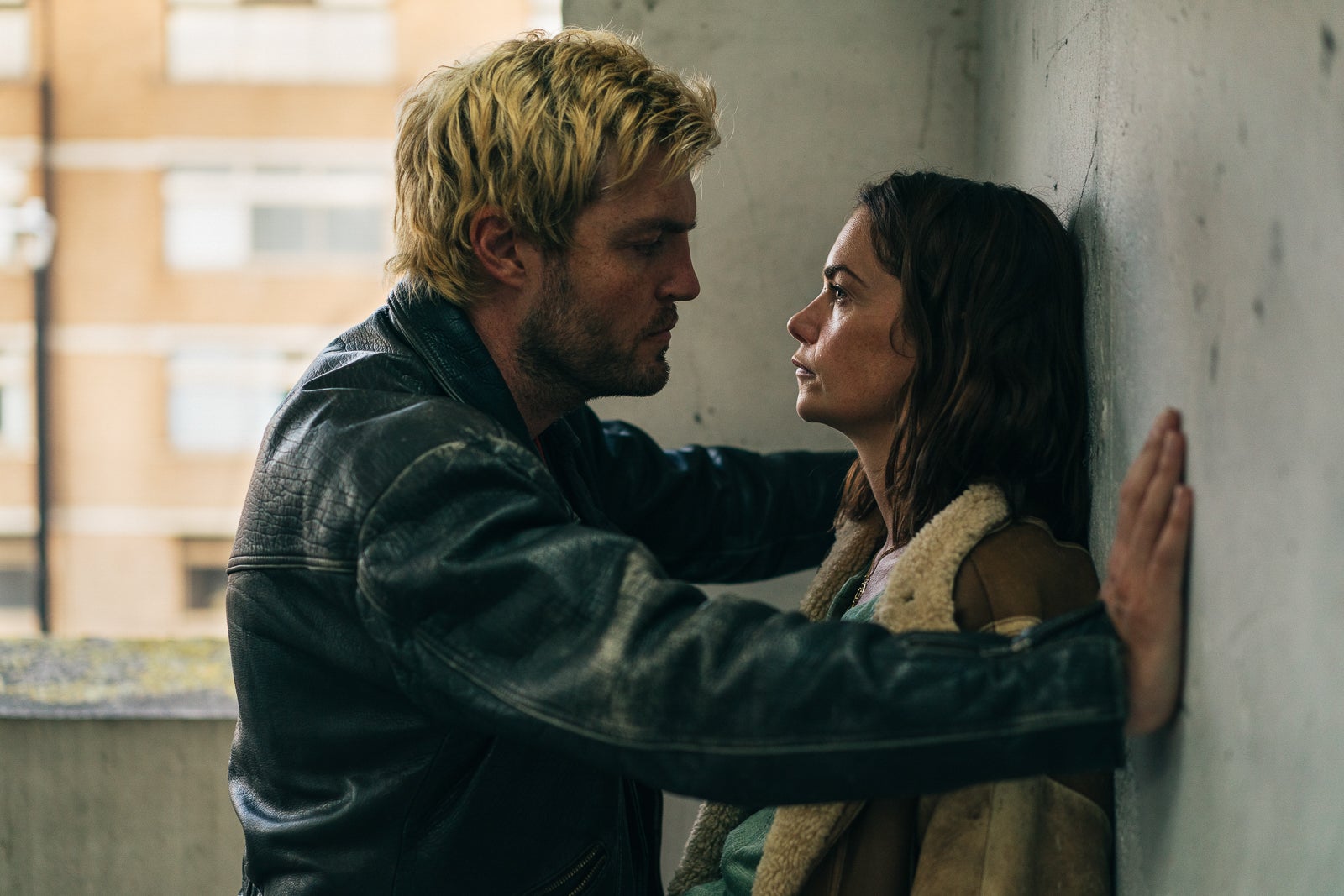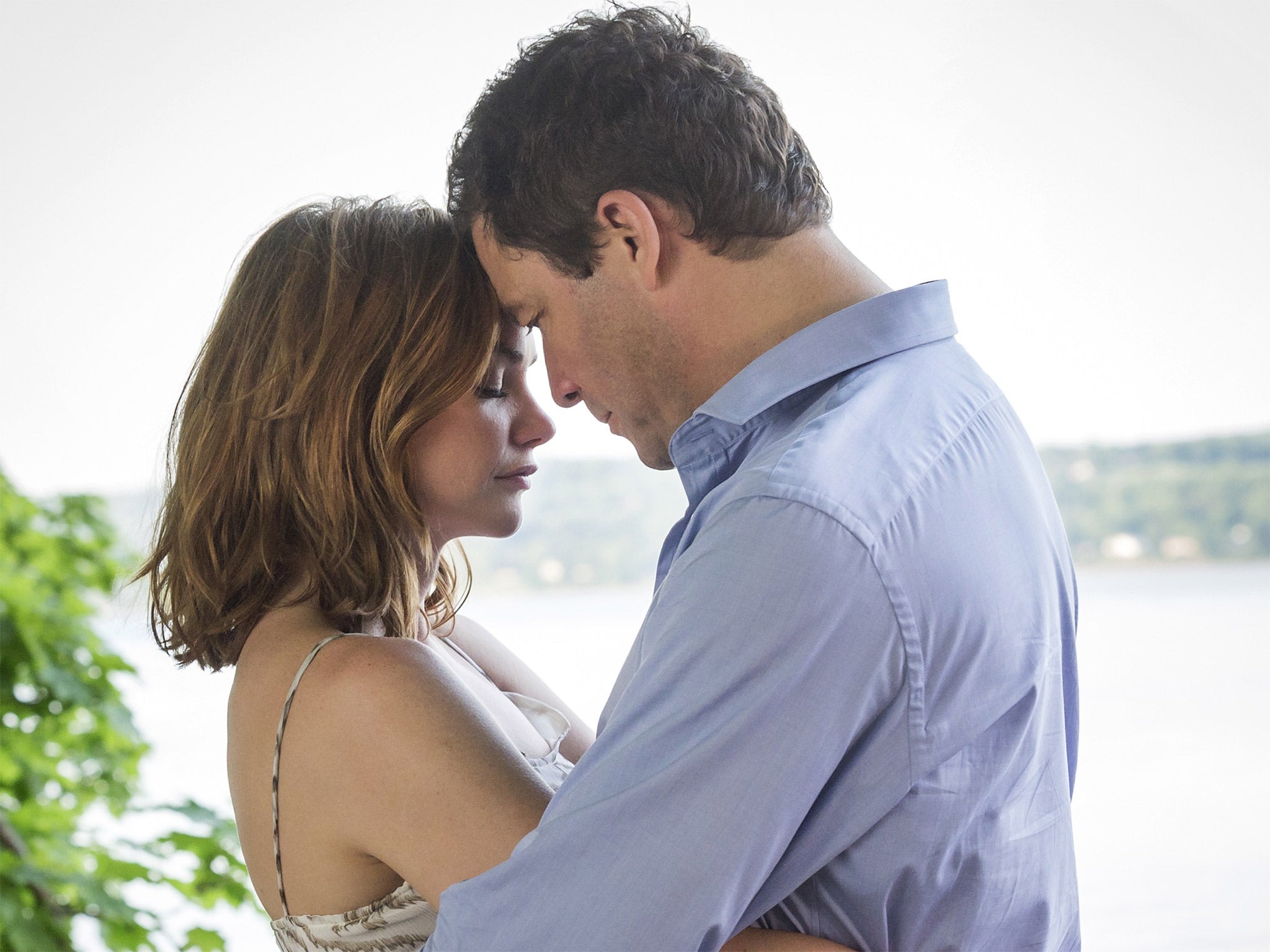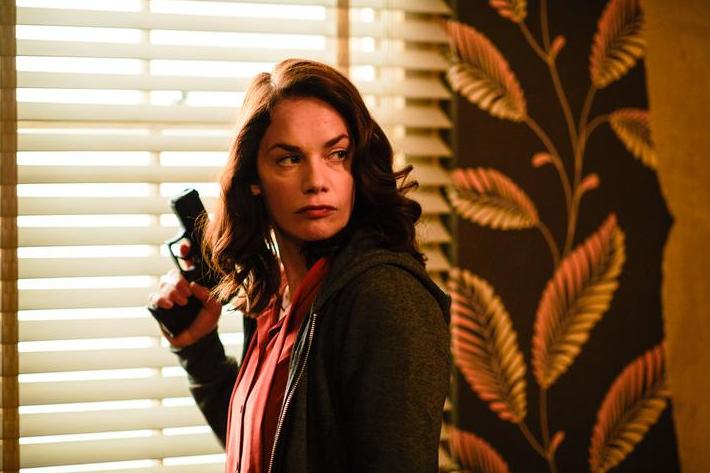
I thought this is virtually impossible. So yes, I’ll do it,” says Ruth Wilson with a laugh and a wide smile. She is talking about her new role in The Human Voice, which opens at the Harold Pinter Theatre on 22 March. But she might as well be offering a mission statement for her entire career.
In Jean Cocteau’s play she conducts a 60-minute monologue on the telephone to her departing lover. We don’t see him or hear him. “I just walk around the room, talking to myself. It’s really hard. I think it’s going to be quite a weird meditative thing.”
She smiles again, almost shy, the light moving across her face. We are sitting wrapped in coats outside the café where we met an hour earlier in southeast London, halfway between her home and the rehearsal room. When it closed, we perched on a wooden planter under a tree. Wilson is being friendly, charming and heroic. Halfway into our chat, I had discovered that my tape hadn’t worked; she gamely agreed to cover the ground again. Hence the shivering.
There is something heroic about her in general. Ever since she arrived on our screens in 2006 as a young Jane Eyre, cast straight out of drama school, she has carved a distinctive path, mixing high-profile parts such as Mrs Coulter in His Dark Materials, Alice Morgan in Luther, and Alison in The Affair, with adventurous smaller scale films and theatre work.
Her beauty, which is the kind that makes you breathe in deeply even when – as today – she’s wearing a black baseball cap and woolly grey jumper, is animated by a sense of intelligence and fun. There is a constant sense of a woman shaping her own destiny, making choices that stretch and define her rather than falling into any predetermined pattern.
She’s often described as someone who chooses to play complicated women but it’s a characterisation she semi-rejects. “I just think people are complex,” she says. “In any part I get I probably put that in there. There are so many things you must go through in life. I just don’t think it’s simple.”
That’s why she puts just as much effort into the contradictions of Mrs Coulter – “she’s so comic book villain but psychologically so interesting” – as into the protagonist of The Human Voice. It also explains her other current project, playing Kate, a bored clerk in a benefits office in Ramsgate who embarks on a reckless, passionate affair with one of her clients, played by Tom Burke.
The film, True Things, which comes out on 1 April, is Wilson’s second venture as a producer. She bought the rights to Deborah Kay Davies’s book as soon as it came out. “It felt very honest, and it was like an acutely subjective lens on a particular moment in relationships that I felt hadn’t been witnessed before on screen. The first initial throes of romance where it’s like infatuation and it can be obsessive.”

Wilson’s performance is astonishingly raw and direct – she is always an actress who seems to have scraped away any redundant layers, leaving only the pure emotion of what she is doing. “I felt performing it that it was the most me that I’ve been,” she says, thoughtfully. “That I didn’t have to tell a story or narrate as an actor. It was my job to be observed. The book reads like a series of moments in this woman’s life, so don’t try to connect the dots. The director and the audience will do that. I found it a liberating process.”
The sexual encounters in the film are disarmingly intimate. “There’s very little nudity in True Things,” she points out. “But it is incredibly sexy and explicit in some ways. I’ve never had an issue with nudity, per se, it’s about the nature of the scenes. Everyone has their own boundaries, and for me, if it doesn’t feel genuine, I start to distrust why it’s there.
“In True Things each sex scene depicts the journey of the relationship. Sexuality is part of human nature. We have to put it on screen so it’s not about taking it out. It’s about making it really specific and honest.”

On the film, Wilson called in the intimacy coordinator Ita O’Brien and they choreographed the encounters in advance. “If people are able to have conversations and talk about the intent, and where their boundaries are and what the director wants, it’s a really great thing. It’s not just two actors getting on with it.
“Invariably, doing that you feel uncomfortable. At best its awkward, at worst it can become quite exploitative and you’re not getting it right anyway. Weirdly, by talking about it, by choreographing it, you can probably get scenes that are safer for the actors, but also more explicit and interesting, natural, real, honest portrayals of sex.”
She cares about these things. Her experience on The Affair, which she left after four series amid complaints about a toxic environment on set, led her to set up a consent workshop under the auspices of the British Film Institute, aimed at helping drama students negotiate their power to say no. The industry guidelines on the filming of intimate scenes, which O’Brien was instrumental in devising, offer similar clarity.
Such initiatives are part of Wilson’s interest in the way she can use her power as a producer and her talent as an actress to create and portray parts where women have more agency and are given more reality. It’s something she has felt from the start; even two years into the industry, at the age of 26, she was lobbying for a film festival for women. “They were like who are you? Go away!”
In Europe, older women have a value, and they don’t suddenly lose their sexuality at 35
Later, once she got beyond the ingenue stage, there was a shortage of roles that interested her. “There was a period when there were great opportunities, but the roles were a bit limited in my mind. They were all women left with crying babies. And even though they were big commercial things, I just thought, wow, is this what is on offer to 29-year-olds? This is embarrassing. I’ve got to change this. It doesn’t mean we don’t have mothers on stage or film any more; it just means you are digging into what that actually means, and what the complexities are.”
Wilson believes Britain and America are much more guilty of placing limitations on women than the rest of the western world. “It does seem that in Europe screen writing and filmmaking seem to value women of all decades, rather than just between the ages of 20 and 40. There are more parts for older women, and women keep being addressed, watched and listened to. Older women have a value, and they don’t suddenly lose their sexuality at 35. Life only gets bigger and more fascinating. That’s what we should be watching.
“Maybe in the UK, we are more puritanical, maybe we value beauty and youth too much, or maybe we have to serve the greater market, which is America, because we share a language.”
She isn’t gloomy about any of this. “We have progressed,” she says. “Things are getting better. Watching what’s happening in Ukraine makes me realise how fragile our lives and freedoms are and in a split second all those privileges can be overturned. I believe in progress. There is always more to be done, but it’s worth celebrating what we’ve already achieved.”

Her natural impulse towards justice was first exhibited as a child when she led a campaign to get sex education lessons in her Catholic school, helped by the fact that her father was chair of governors at the time. “Sometimes I just don’t understand why things haven’t happened. For example, why aren’t women getting paid equally if you are an equal?
“It is quite a hard discussion to have. Value is based on so many things, how much you’ve done, how commercial it is. But if a man and a woman are at the same level, invariably the man will get more. And even out of drama school, a male kid will get more than an equal girl. I just do not understand that.”
I ask how she has improved her own negotiating position in this cut-throat world. “I’ve got a really good lawyer on board and it’s about him fighting for your value. But I don’t think, for women, that we have solved the problem, though some male actors are being transparent about what they are paid so at least we can have the discussion.”
In January, Wilson turned 40. How did that make her feel? “Up and down,” she says, with a gentle laugh. “There are moments when I didn’t care about it happening at all. But you do suddenly think, I’ve done 20 years of scrabbling, getting there, what happens now? What do I really want? It’s also a loss. There’s a loss of youthful optimism, and of expectation of the dreams that can be fulfilled. I feel very reflective and quiet.”

She’s excited though to be back on stage in The Human Voice and working again with director Ivo van Hove. They first collaborated on his production of Hedda Gabler at the National Theatre in 2016, and she hasn’t been on stage in Britain since, though she did pull off a remarkable double act of Cordelia and the Fool in New York, with Glenda Jackson, then 82, as her King Lear. “What a powerhouse!” says Wilson, with admiration. “We were doing eight shows a week, in a three-and-a-half-hour-long play. Her work ethic and passion never diminished and she has a fight in her that I hugely admire.”
One quality Wilson loves about working with van Hove is that he strives to keep the same kind of immediacy in his productions. “He’s very happy to do as little rehearsal as possible,” she says. “You get straight into your costume, with the props, from day one. It means you have to make decisions. You haven’t got enough time to think. You just have to do. I found it incredibly freeing. Also the way he directs is not psychological, it’s totally physical. He will say something like ‘die like a fish’. He inspires me. I smile whenever I work with him, because I am like, that was a weird note, but I love it!”
The monologue was written by Cocteau in 1930 when an actress challenged him to create better parts for women. “He wrote this as a response and it’s almost an impossible task.” Wilson believes the play has peculiar potency in a post-pandemic world. “It’s about isolation. This woman is locked into her own space. I feel that feels relevant to everyone today,” she says. “The fact that we have these phones that we do all our communication over. We’ve been doing Zooms, connecting friends, families and lovers across and through a machine. It’s not the same as being able to touch someone or physically hear someone. You don’t have the same communication.”
During lockdown, she kept in touch with her partner, who lives in New York, by phone. “Although normally we travel a lot for each other, we’ve always been very good at using the phone and being connected. But the intensity of the pandemic and time apart made me miss human contact more than ever. That’s perhaps what we are all experiencing. That’s why theatre is so important. The community of being in space with people.”
‘The Human Voice’ opens at the Harold Pinter Theatre on 22 March. ‘True Things’ is in UK cinemas from 1 April







